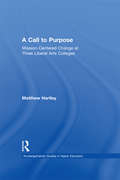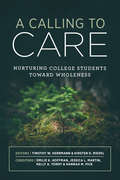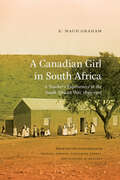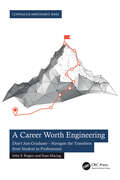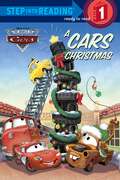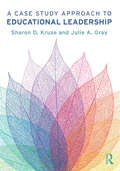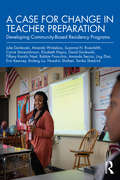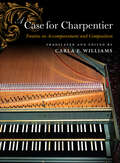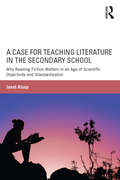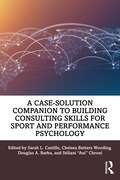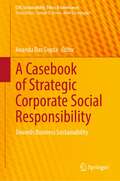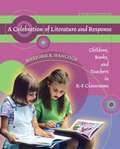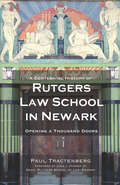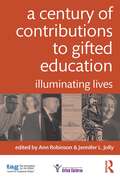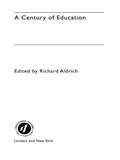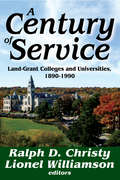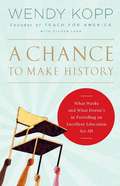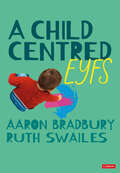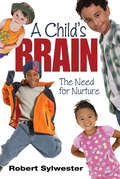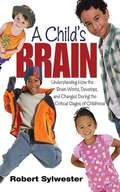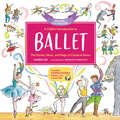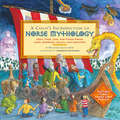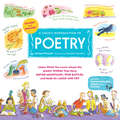- Table View
- List View
A Call to Purpose: Mission-Centered Change at Three Liberal Arts Colleges (RoutledgeFalmer Studies in Higher Education)
by Matthew HartleyA decade ago, the majority of liberal arts colleges, suffering from a decline in resources, drifted from their traditional missions. This study looks at three insitutions and suggests that a clear mission is more than a common goal.
A Calling to Care: Nurturing College Students Toward Wholeness
by Timothy W. Herrmann Kirsten D. RiedelDespite the widely differing perspectives held by those who work in higher education, there is one goal upon which all educators and educational leaders agree: students should leave college stronger than they came. Now more than ever, today's students come to college with unique intellectual, emotional, relational, and spiritual challenges. They need more than appropriate curricula, programs, facilities, and resources. Educating college students well requires a concern for and commitment to a holistic vision of their care. This volume examines the calling that Christian educators—in both curricular and cocurricular settings—share in relation to the students they serve. Join this unique blend of experienced practitioners and researchers, including Miroslav Volf, Sharon Daloz Parks, and John Foubert, in considering how we can best nurture our students toward health, wholeness, and purpose.
A Canadian Girl in South Africa: A Teacher's Experiences in the South African War, 1899–1902 (Wayfarer)
by E. Maud GrahamA Canadian woman shares her story of traveling to South Africa to teach Boer children in concentration camps following the South African War.As the South African War reached its grueling end in 1902, colonial interests at the highest levels of the British Empire hand-picked teachers from across the Commonwealth to teach the thousands of Boer children living in concentration camps. Highly educated, hard working, and often opinionated, E. Maud Graham joined the Canadian contingent of forty teachers. Her eyewitness account reveals the complexity of relations and tensions at a controversial period in the histories of both Britain and South Africa. Graham presents a lively historical travel memoir, and the editors have provided rich political and historical context to her narrative in the Introduction and generous annotations. This is a rare primary source for experts in Colonial Studies, Women’s Studies, and Canadian, South African, and British Imperial History. Readers with an interest in the South African War will be intrigued by Graham’s observations on South African society at the end of the Victorian era.“A fascinating perspective on the country. . . . Graham’s account will help others understand how the British and English-speaking Canadians in South Africa perceived Boers and native southern Africans at the turn of the twentieth century, and her descriptions reveal details about everyday life in South Africa at an important moment of transition.... Graham’s book represents the perspective of a well-embedded outsider reporting to far-removed readers, rather than that of a female teacher involved in international or imperial education.” —Benjamin Bryce, Historical Studies in Education“Recommended for those who wish to learn more about South African history and early race relations or tensions. Graham’s opinionated writing will amuse and interest those researching women’s studies.” —Amy L. Crofford, African Studies Quarterly, Volume 16
A Cane In Her hand
by Ada B. LitchfieldVal who had had O.K. vision before one day had trouble seeing. After visiting the doctors, and trying to see, she was taught how to use a cane by her teacher.
A Career Worth Engineering: Don't Just Graduate—Navigate the Transition from Student to Professional (Continuous Improvement Series)
by John S. Rogers Sean MaciagTransitioning from student to professional can be a challenging journey, but it doesn't have to be a daunting mystery. In A Career Worth Engineering: Don't Just Graduate—Navigate the Transition from Student to Profession, the authors draw from their own experiences and share valuable lessons learned in the foundational years of their careers.The authors offer practical steps and insights to empower readers to take control of their career paths. By sharing their experiences, they aim to help others navigate the challenges and uncertainties of transitioning from student to professional. This book is designed to accelerate career growth and help individuals achieve their full potential, goals, and confidence in the engineering field.This book is a guide for new engineering students, recent graduates searching for their first job, or professionals feeling stagnant in their careers.
A Cars Christmas (Step into Reading)
by Melissa Lagonegro RH DisneyCelebrate the holidays with Lightning McQueen, Mater, Sally, Doc Hudson, and the rest of the cool Cars characters in this brand-new Step 1 reader.
A Case Study Approach to Educational Leadership
by Sharon D. Kruse Julie A. Gray<i>A Case Study Approach to Educational Leadership</i> takes on six core areas of school leadership—organizational vision; curriculum, instruction, and assessment; school and external community; school climate and culture; equity; and improvement, innovation, and reform. Using a case learning approach, this volume introduces salient theoretical and empirical literature in each core area and provides illustrative cases designed for individual and group analysis. Written for aspiring educational leaders, this book facilitates the discussion and reflection of individual and collective professional judgment and helps developing leaders make sense of the challenges school leaders face today.
A Case for Change in Teacher Preparation: Developing Community-Based Residency Programs
by Erin Kearney Xiufeng Liu Corrie Stone-Johnson Julie Gorlewski Amanda Winkelsas Suzanne N. Rosenblith Elisabeth Etopio David Gorlewski Tiffany Karalis Noel Bobbie Finocchio Amanda Seccia Ling Zhai Nooshin Shafaei Tanika ShedrickWhy are preservice teachers often told by veteran teachers to "forget what you learned" in teacher preparation programs? Why is there a gap between pedagogical practices employed at schools and those taught at colleges and universities? And why, after evidence from countless studies, are there still so few teachers of color working in our rapidly diversifying schools? These questions are addressed in this book, which describes a reconceptualized teacher preparation program based on a teacher residency model. This model is grounded in three core beliefs: first, that teacher quality is a shared responsibility between universities and school districts; second, that all students have a right to high-quality teachers who are as racially, ethnically, and linguistically diverse as the students they teach; and third, that for education to be transformative, future educators must have the right balance of theoretical knowledge and practical experiences grounded in specific contexts. Through a combination of rich description and qualitative and quantitative program data, the authors make the case that university programs focused on the communities they serve can ensure more effective, learner-ready teachers who remain in the profession longer. By providing a detailed blueprint for program development, the contents of this book will be of value and interest to educational leaders, policy makers, and researchers.
A Case for Charpentier: Treatise on Accompaniment and Composition (Historical Performance)
by Carla E. WilliamsWho originally authored the anonymous, undated French manuscript Traité d'accompagnement et de composition? Carla E. Williams tackles this mystery while providing the first English translation of this rare manuscript, which resides in the collections of the Lilly Library at Indiana University Bloomington. A Case for Charpentier presents a side-by-side transcription and translation of the treatise along with an introduction that offers historical context. In the manuscript itself, late 17th-century and early 18th-century writers discuss principal musical elements of composition including major and minor modes, the fundamental chords of both modes, dissonances and consonances, meter, tempo, and continuo realization, as well as basse continue. While these writers have not been formally identified, Williams argues that the handwriting of one is that of composer Marc-Antoine Charpentier. By providing a full physical description of the manuscript, along with comparisons of Charpentier's other writings and his handwriting, Williams sheds new light on both the treatise and Charpentier's theoretical writings. With this translation, Williams not only shares invaluable insights into the pedagogical approaches for composition and continuo realization in late 17th-century France but also finally makes Traité d'accompagnement et de composition available to a broader audience.
A Case for Teaching Literature in the Secondary School: Why Reading Fiction Matters in an Age of Scientific Objectivity and Standardization
by Janet AlsupTaking a close look at the forces that affect English education in schools—at the ways literature, cognitive science, the privileging of the STEM disciplines, and current educational policies are connected—this timely book counters with a strong argument for the importance of continuing to teach literature in middle and secondary classrooms. The case is made through critical examination of the ongoing "culture wars" between the humanities and the sciences, recent research in cognitive literary studies demonstrating the power of narrative reading, and an analysis of educational trends that have marginalized literature teaching in the U.S., including standards-based and scripted curricula. The book is distinctive in presenting both a synthesis of arguments for literary study in the middle and high school and sample lesson plans from practicing teachers exemplifying how literature can positively influence adolescents’ intellectual, emotional, and social selves.
A Case-Solution Companion to Building Consulting Skills for Sport and Performance Psychology (Building Consulting Skills for Sport and Performance Psychology)
by Chelsea Butters Wooding Douglas A. Barba Stiliani “Ani” Chroni Sarah L. CastilloThis international compilation offers a range of potential solutions to case studies that cover pertinent issues within a variety of performance environments. Offering a companion text to Building Consulting Skills for Sport and Performance Psychology: An International Case Study Collection, this book provides three solutions for each of the case studies introduced. In so doing, it highlights that there is no "one-answer-fits-all" solution to the common issues with sport and performance psychology consulting and offers various suggestions for how an individual may wish to approach these and similar cases. Solutions address the CEDI principles (Case Conceptualization, Ethical Considerations, Diversity Awareness/Reflection, and Intervention Planning and Evaluation), as well as any case-specific questions. This clearly structured book serves as a useful resource for instructors looking to deepen discussion and offer alternatives to students’ ideas on how to approach certain cases. It will also be of interest to practitioners when approaching similar situations in their own work and looking for new pathways that they may not have considered.
A Casebook of Strategic Corporate Social Responsibility: Towards Business Sustainability (CSR, Sustainability, Ethics & Governance)
by Ananda Das GuptaThis casebook argues that corporate sustainability agendas should look beyond stakeholder demands and desires, towards strategic opportunities to achieve social and commercial benefits simultaneously. It encourages shifting focus from a strategic approach to a sustainable business practice. As the cases in the book highlight, it is in every company’s best interest to identify a manageable number of sustainability initiatives whose shared benefits—for society at large and the company—are significant and also substantially help the company strategically position itself in the competitive marketplace. Strategic sustainable business practices can lead to shared value creation, strengthening the company’s competitiveness and establishing a symbiotic relationship. Companies can achieve solid profits by doing good things for the environment; it is a “win-win” for society and for business. This casebook provides examples of multi-stakeholder partnerships that aim to create sustainable enterprises. Ideal for teaching purposes, after a brief introduction to the case method, the cases are presented with no comments or criticisms.
A Celebration of Literature and Response: Children, Books, and Teachers in K-8 Classrooms
by Marjorie R. HancockThis engaging book applies reader response theory to children's literature methods to help new and experienced teachers best involve kindergarteners through eighth graders in literature and literacy. Authentic student responses open chapters, book clusters and the accompanying CD database of children's literature provide guidance for involving students with literature, and Literature Resources on the Web guide users to lesson plans, standards, author interviews, projects, and other Internet resources to enrich teaching. For teachers of Children's Literature.
A Centennial History of Rutgers Law School in Newark: Opening a Thousand Doors
by Paul TractenbergFounded in 1908 as New Jersey Law School, Rutgers School of Law, Newark possesses a distinctive spirit of excellence, opportunity and innovation. From the beginning, the school welcomed women and the children of immigrants. For the past forty years, its student body has embraced racial, ethnic and socioeconomic diversity, literally changing the face of the legal profession. Rutgers Law has pioneered clinical legal education, instilled in its students a commitment to social justice and public service and counted numerous top scholars and practitioners among its faculty. Not infrequently in its first one hundred years, Rutgers Law has overcome societal, governmental and economic upheavals. Now, new challenges confront it. Distinguished professor of law Paul Tractenberg chronicles the first century and looks with optimism to the future.
A Century of Contributions to Gifted Education: Illuminating Lives
by Jennifer L. Jolly Ann RobinsonA Century of Contributions to Gifted Education traces the conceptual history of the field of gifted education. Bookended by Sir Francis Galton’s Hereditary Genius published in 1869, and Sidney Marland’s report to the United States Congress in 1972, each chapter represents the life and work of a key figure in the development of the field. While the historical record of gifted education has previously been limited, A Century of Contributions to Gifted Education explores the lives of individuals who made fundamental contributions in the areas of eminence, intelligence, creativity, advocacy, policy, and curriculum. Drawing heavily on archival research and primary source documentation, expert contributors highlight the major philosophical, theoretical, and pedagogical developments in gifted education over the course of a century, providing both lively biography and scholarly analysis.
A Century of Education (Education K-12 Ser. #14)
by Richard AldrichEducation is a country's biggest business and the most important shared experience of those who live in it. A Century of Education provides an accessible, authoritative and fascinating overview of the role and nature of education in the twentieth century. Eminent historian of education, Professor Richard Aldrich has assembled a team of contributors, all noted experts in their respective fields, to review the successes and failures of education in the last century and to look forward to the next. A succinct overview of twentieth century social, economic, political and intellectual developments in the first chapter is followed by chapters on ten key topics. Each chapter has four sections: a review of the educational situation in 2000; a similar assessment in 1900; changes and continuities throughout the century; and a conclusion reviewing the lessons for today and tomorrow. This is a work of information, interpretation and reference, which demonstrates the strengths and weaknesses of education during the twentieth century and identifies educational priorities for the twenty first. For anyone interested in what has become the most important Issue of our time, this unique book is set to become a classic text.
A Century of Service: Land-Grant Colleges and Universities, 1890-1990
by Ralph D. Christy Lionel WilliamsonIn 1890 congressional legislation opened a new chapter in the history of higher education by allocating public support for black Land-Grant colleges and universities.These institutions were established to provide training to blacks in the fields of agriculture, home economics, the mechanical arts, and other useful professions. For a century, these schools have assumed and continue to maintain a unique and important role in affording educational opportunities for thousands of students to whom no other doors would have been opened. A Century of Service is both a history and a celebration of these Land-Grant schools. The work also provides a presentation of views on how their original mission can best be adapted to the challenges of the future. The 1890 Land-Grant institutions are a legacy of what can be accomplished with little more than a determined, tenacious commitment to survive and excel. In spite of unequal financial support, they have succeeded in establishing and building quality resident academic and extension programs on a par with those of other colleges and universities not suffering the same economic limitations. As demonstrated throughout this volume, the 1890 institutions have amassed an impressive record of achievement in the areas of agricultural research, cooperative extension, development of rural communities' support systems, human resources development, resident instruction, international development, and technology and information transfer. In assessing the current state of the schools and looking to the future, the authors seek ways of building upon their strengths and traditions and explore alternative institutional designs to enhance the status and opportunities for African American agricultural scientists and professionals under quite new circumstances. A Century of Service will be of interest to social historians, black studies specialists, agricultural scientists, and educators.
A Chance to Make History: What Works and What Doesn't in Providing an Excellent Education for All
by Wendy KoppOn Teach For AmericaOCOs twentieth anniversary, its founder offers an inspiring summation of the lessons learned: The achievement gap can be closed, and thereOCOs nothing elusive about what it will take
A Child Centred EYFS
by Aaron Bradbury Ruth SwailesAs EY practitioners, we know that child-centred practice is what matters. Despite the pressures for more ′school like′ learning in the Early Years, EY professionals and practitioners continue to advocate for child-led best practice in settings. This book is a toolkit for all those working with children on how to develop and implement a child centred curriculum for delivery of the EYFS. A curriculum that is research informed and based on what we know about children′s development and learning. A curriculum that ensures children have the time and space to explore and develop the fundamental building blocks of early development.
A Child Centred EYFS
by Aaron Bradbury Ruth SwailesAs EY practitioners, we know that child-centred practice is what matters. Despite the pressures for more ′school like′ learning in the Early Years, EY professionals and practitioners continue to advocate for child-led best practice in settings. This book is a toolkit for all those working with children on how to develop and implement a child centred curriculum for delivery of the EYFS. A curriculum that is research informed and based on what we know about children′s development and learning. A curriculum that ensures children have the time and space to explore and develop the fundamental building blocks of early development.
A Child's Brain: The Need for Nurture
by Robert A. SylwesterWritten for parents and educators, this guide explains the latest neuroscience research regarding how a child's brain works and how to nurture children for optimal development.
A Child's Brain: Understanding How the Brain Works, Develops, and Changes During the Critical Stages of Childhood
by Robert SylwesterWith A Child's Brain you can learn how a child's brain works, develops, and changes during the critical stages of childhood. Robert Sylwester, author of twenty books, has written this latest book to help parents and educators understand children's cognitive development and provide suggestions on how to nurture children to their full potential. A Child's Brain is a rich resource that:Examines the neurobiology of childhood, explaining the body and brain systems that develop during pregnancy, infancy, and childhoodExplores factors that can enhance or delay development, such as nutrition, family life, relationships, illness, intelligence, technology, creativity, and the artsProvides practical suggestions to help adults promote healthy development and successful learning in the children they encounter at home, at school, and everywhere elseIncludes a glossary of neurobiological termsAnd covers much more!A Child's Brain helps parents and educators understand the biological, emotional, and neurological changes that occur during childhood so they can support children's learning, socialization, and growth.
A Child's Introduction to Ballet: The Stories, Music, and Magic of Classical Dance (Child's Introduction Series)
by Laura LeeThis enchanting introduction to the wonderful world of ballet has been updated to include a removable poster and access to 25 downloadable music tracks. Young dancers have fallen in love with this charming, illustrated exploration of the world's great ballets. Featuring twenty-five famous and beloved pieces such as Swan Lake, The Nutcracker, Peter and the Wolf and Fancy Free, these stories bring iconic performances to life, and inspire readers to listen and dance along to the music that has made them enduring classics. Woven into these tales is a captivating history of ballet, filled with information and profiles of the world's greatest dancers, choreographers, and composers. Young readers will also enjoy fun facts and dancing how-tos all while listening to excerpts of classical music. Also included is a removable, fold-out poster depicting the five positions of ballet.
A Child's Introduction to Norse Mythology: Odin, Thor, Loki, and Other Viking Gods, Goddesses, Giants, and Monsters (A Child's Introduction)
by Heather Alexander Meredith HamiltonPacked with action, intrigue, trickery, and love, A CHILD'S INTRODUCTION TO NORSE MYTHOLOGY acquaints kids with the original North Germanic and Scandinavian folklore behind characters like Thor and Loki, plus other gods, goddesses, giants, dwarves, and more. The newest book in the best-selling, award-winning A Child's Introduction series explores the popular and captivating world of Norse mythology. Organized into two parts, part one introduces characters like Odin, the leader of the Norse gods; Thor and his mighty hammer Mjollner; Frigg, weaver of the destinies of humans and gods; frost and fire giants; cunning dwarves like Brokk and Eitri; and many more. Part two tells the stories of the suspenseful myths themselves including The Creation of the Cosmos, The Aesir-Vanir War, Loki Bound, Thor's Hammer and many more. Full of charming and witty illustrations from Meredith Hamilton, a Norse name pronunciation guide, and a removable Norse Family Tree, A CHILD'S INTRODUCTION TO NORSE MYTHOLOGY is the perfect way for kids to learn the historic stories behind today's popular mythical characters.
A Child's Introduction to Poetry: Listen While You Learn About the Magic Words That Have Moved Mountains, Won Battles, and Made Us Laugh and Cry (Child's Introduction Series)
by Michael DriscollThis delightful, interactive journey through the history of the world's poetry now includes a removable poster and access to downloadable audio, allowing kids to listen and learn as they experience the magic of the spoken word. Poetry can be fun -- especially when we can read it, hear it, and discover its many delights. A Child's Introduction to Poetry joyously introduces kids (and parents) to the greatest poets in history -- from Homer and Shakespeare to Langston Hughes and Maya Angelou -- and provides excellent examples of their work and commentary on what makes it so special and everlasting. The book covers every style of poem, from epics and odes, to nonsense verse and haikus, and is filled with examples of each one. This multimedia package encourages children to listen, read, and learn, and opens the door to a lifetime of appreciation of a rich literary tradition. Also included is a removable, fold-out poster of "Jabberwocky" by Lewis Carroll, one of history's most iconic poems.
